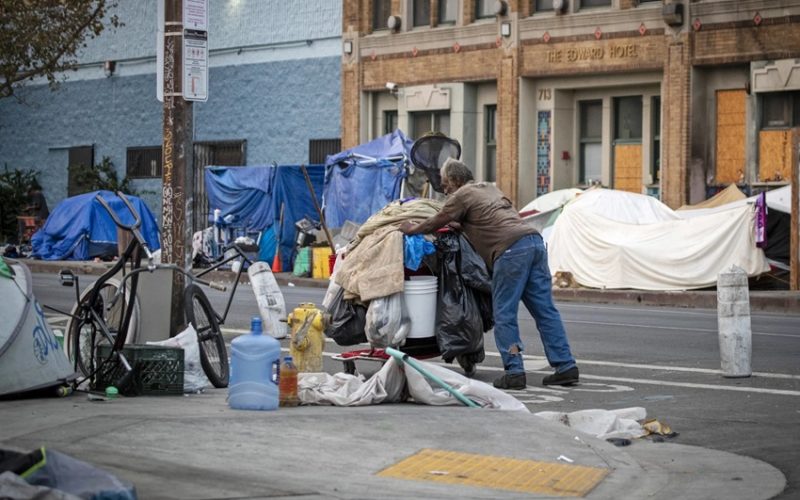Salem, OR – As the nation prepares for the return of Donald Trump to the White House in January 2025, many social issues are poised for a significant shift. Among the most pressing challenges is the ongoing homelessness crisis, which the former president has vowed to tackle with sweeping reforms. However, his proposed solutions—largely built on strategies that have failed in the past—are drawing criticism from advocates and experts who argue that such measures will only deepen the crisis.
Trump’s plan, announced in the months leading up to his inauguration, calls for the creation of large encampments on inexpensive land, where unsheltered individuals would be forced to live and receive services from social workers, treatment specialists, and behavioral health professionals. The plan also includes the option of incarceration or forced commitment to mental health institutions for those who refuse to comply with these conditions. While these proposals have been met with enthusiasm by some, they are reminiscent of past efforts that failed to address the root causes of homelessness.
The idea of “housing” the homeless in government-run camps or institutions is not new. Over the last few years, versions of this proposal have surfaced in liberal cities such as Portland, Oregon, and across the West Coast. These plans have all failed for a variety of reasons, including the enormous costs involved in operating such systems at scale and the challenge of enforcing compliance without violating basic civil rights.
In fact, the incarceration strategy—often touted as a way to curb homelessness—has been implemented on a small scale in certain cities. However, data shows that such approaches have had little impact on the overall homeless population. Historically, these systems have only been effective for a small percentage—less than 5%—of the homeless, according to social service experts. These numbers highlight a significant flaw: the failure of punitive measures to address the underlying issues of homelessness, which are far more complex than simply enforcing compliance or criminalizing the homeless.
Advocates for the homeless and experts in the field argue that the solution to homelessness lies not in punishment or containment, but in systemic change. Housing First—a widely supported approach that prioritizes stable, permanent housing without preconditions—has proven to be one of the most effective strategies in addressing homelessness. Alongside this, harm reduction models, which offer supportive services without coercion, have seen success in several regions across the country.
“The best solution is housing, plain and simple,” says Dr. Sheila Murphy, a social work professor at the University of Oregon. “The focus should be on providing individuals with the stability they need to regain independence and dignity. Once housed, individuals can address issues like mental health, substance abuse, and employment through supportive services.”
For many experts, the homelessness crisis is rooted in broader economic issues such as the lack of affordable housing, stagnant wages, and rising healthcare costs. While personal circumstances, like job loss, divorce, or injury, can contribute to homelessness, systemic inequality and economic hardship are often the larger drivers.
This year, the U.S. Supreme Court cleared the way for local governments to criminalize homelessness, a decision that has raised alarms among civil rights groups. In Oregon, a state that had long been a stronghold for homeless protections, lawmakers are now reconsidering those policies in light of the Court’s ruling. For many advocates, the decision marks a turning point in how the homeless are treated under the law. In particular, Oregon’s House Bill 4002, which recriminalized drug possession, has already created a legal framework that may be used to push homeless individuals into treatment programs under threat of prosecution.
However, critics argue that these programs often serve as a backdoor for criminalizing homelessness itself, rather than addressing the social and economic factors that drive individuals onto the streets. “Recriminalization is not a solution,” says Mark Rogers, director of the Oregon Coalition on Homelessness. “It’s a way to shuffle people from one system to another without actually solving the problem.”
The proposal to establish government-run camps for the homeless has gained traction in Oregon, a state where homelessness has long been a prominent issue. In 2023, a statewide homeless count estimated that 20,110 people were living without shelter. The numbers have been rising steadily, and local governments are increasingly looking for ways to address the crisis. Proponents of the camp idea argue that it could provide a temporary solution to the growing number of unsheltered people. However, critics warn that these encampments will only worsen the crisis, creating isolated, stigmatized communities without long-term housing solutions.
“Instead of solving the problem, these camps would just perpetuate it,” says Rogers. “We need to focus on building affordable housing, not concentrating people in isolated locations that will only further marginalize them.”
Oregon finds itself at a crossroads. The state’s longstanding homeless protections, which were crafted with local input, have helped ensure that the rights of homeless individuals are upheld. But with the new federal proposals looming, the balance of power could shift dramatically. As local governments in Oregon and across the country begin to explore options like forced encampments or criminalization, advocates are urging lawmakers to resist the temptation to repeat the mistakes of the past.
“We cannot forget the lessons of history,” says Murphy. “We’ve been down this road before, and it doesn’t work. We need a solution that’s humane, sustainable, and rooted in justice—not one that relies on punishment.”
With 2025 on the horizon, the debate over how to address homelessness is more urgent than ever. The decisions made in the coming months will shape the future of homelessness policy for generations to come. Will the nation double down on failed punitive approaches, or will it finally embrace solutions grounded in dignity, economic justice, and evidence-based practices? Only time will tell.











